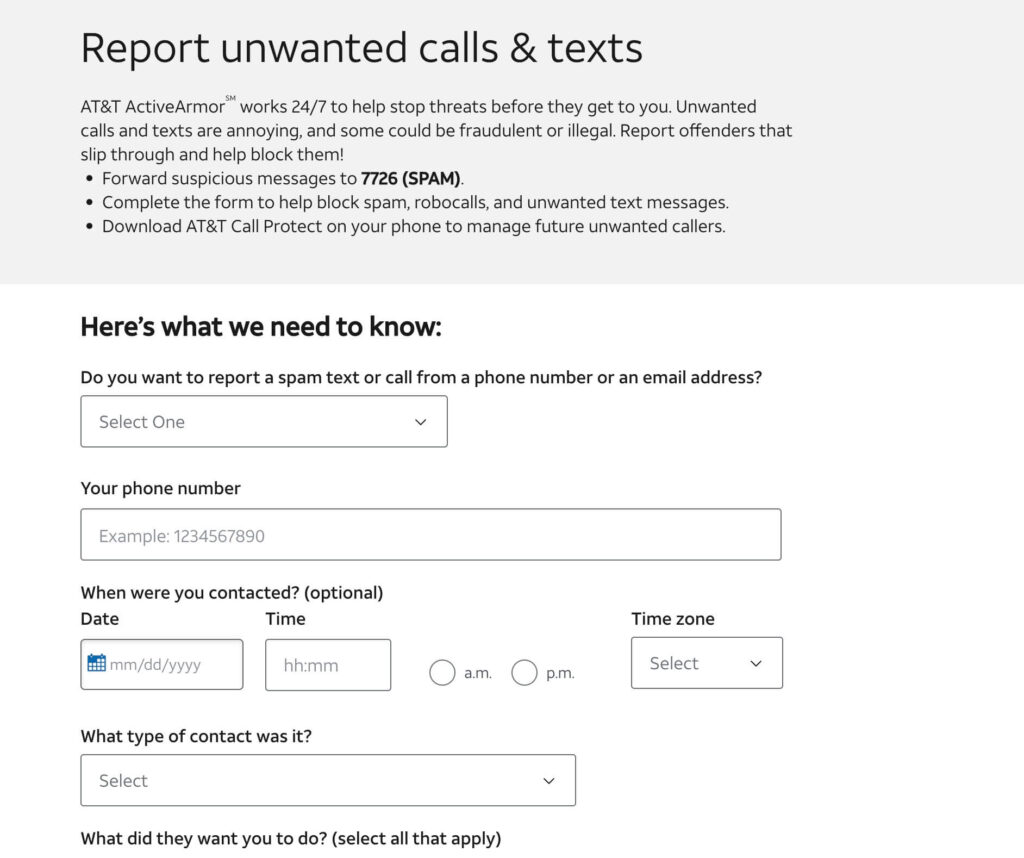Your Guide to AT&T Spam Text Reporting
Will Simonds
Reading time: 6 minutes

Table of Contents
Spam texts and phishing scams are a huge threat when it comes to your personal information. What’s more, the overall number of spam texts scammers send continues to grow.
While cell carries such as AT&T try everything in their power to protect customers, spam texts can slip through the cracks. It’s vital that customers remain vigilant as well.
Below, we’ll explain how you as a customer can report spam texts to AT&T.
Understanding spam texts and their methods
Scammers use spam texts to uncover personal information to use fraudulently. This can include name, address, or credit card details and social security numbers.
Spam texts vary on topic, but can look very real. They might even claim to be official business. Some of the most common spam text formats include:
- Competition winner. A text from an unknown number informs you to follow a link to claim a prize or cash after winning a competition.
- IRS notification. A text says the IRS is trying to make contact about a refund and you need to follow a link to speak to a representative.
- Package delivery. A package has been received from Amazon and you need to click a link to select a suitable delivery time.
- Verify your bank details. A text says your bank account has been frozen and you need to enter your details to gain access.
What’s more, these texts may include a Sender ID to trick you into believing the text is from a legitimate company—like AT&T.
How to spot a scam text
The ultimate goal of a scam text is to get its recipient to click on a malicious link or enter details into an online form on a website.
A recent example of a convincing scam text was a message that included the AT&T logo and a promise of “freebies” to customers who paid their bill on time.
While this scam text and others can appear extremely official, there are key indicators to look out for that may suggest you’re dealing with fraud.
- Timeframe. If the text demands you respond immediately, it may suggest a scam as it’s trying to convey a sense of urgency.
- Unusual link. If the text features a URL to a website you don’t recognize, this might also be a scam. Do not click on the link if you’re unsure.
- Unknown number. Scammers often try to conceal unknown numbers with a User ID. Any texts you don’t recognize should be avoided.
- Spelling errors. Any typos in a message claiming to be “official” might suggest you’re dealing with a scam.
What AT&T is doing about spam texts
According to their website, AT&T “is vigilant about protecting customers from unsolicited text message spam but there is no simple fix to block these.”
Recently, AT&T has ramped up efforts to stop scammers and phishing texts. This has included providing extensive guidelines for customers, as well as ways to report suspicious messages.
How you can stop AT&T spam texts
AT&T currently offers the ActiveArmor mobile security app to all customers for free.
ActiveArmor offers the ability to arm your device with auto-fraud call blocking, reduce spam risks, and data-breach reports.
All AT&T customers are eligible for this service. Simply download the app from any OS app store and you can begin customizing your mobile security preferences.
How to report spam texts to AT&T
AT&T customers can easily report any spam texts by forwarding any suspicious text message via text to the following number: 7726.
You can also report a spam text to AT&T online by contacting their fraud department by email at abuse@att.net.
AT&T has a simple online form (seen below) that customers can fill out if they want to report a scam text. You can access that online form here.

What else you can do to stop spam texts
Both iPhones and Androids have a built-in spam filter that can help recognize potential spam, including spam texts and robocalls.
On iPhones, turn on the spam filter in Settings > Messages > Filter Unknown Senders. Android users can access Settings > Spam Protection > Enable Spam Protection.
Also, consider signing up with a third-party app that specializes in blocking spam texts. There are reputable options on the market at a wide range of price points.
For more useful information, read our guide on how to stop spam texts for a full rundown of all your available options.
Further action you can take to stop spam texts
The fact of the matter is, most individuals are subjected to spam texts because their personal data has been shared by a data-broker platform.
Data brokers harvest personal information from public spaces to sell to marketers, or the highest bidder. In fact, many scammers can often get their hands on your information as a result of dealing with data brokers.
What this means is, the only effective way to stop spam texts is to protect your personal information and remove it from all data-broker platforms.
Unfortunately, with over 500 data broker sites operating in the marketplace, this can be a complicated and time-consuming process.
DeleteMe can help, opting you out of all data-broker sites on your behalf. For as little as $10.75 a month, we complete data-broker opt-out requests for you, and follow up every few months to ensure your information stays safe.
By using a data-broker removal service like DeleteMe, you guarantee a reduced amount of spam texts almost immediately. Find out more about how DeleteMe can help you today.
Our privacy advisors:
- Continuously find and remove your sensitive data online
- Stop companies from selling your data – all year long
- Have removed 35M+ records
of personal data from the web
Save 10% on any individual and
family privacy plan
with code: BLOG10
news?
Don’t have the time?
DeleteMe is our premium privacy service that removes you from more than 750 data brokers like Whitepages, Spokeo, BeenVerified, plus many more.
Save 10% on DeleteMe when you use the code BLOG10.

















